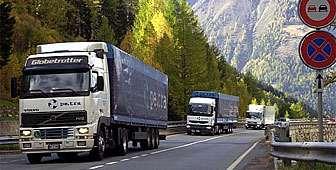Truck drivers concerned about roadways

Road hauliers expect "chaotic conditions" for truck drivers in Switzerland following the closure of the Gotthard tunnel.
However, the closure of the 16 kilometre tunnel through the Alps after a huge fire on Wednesday is not expected to have serious consequences for the Swiss economy, according to the State Secretariat for Economic Affairs.
Up to 5,000 trucks pass through the Gotthard tunnel daily, and the Swiss Road Hauliers’ Association says its closure will inevitably lead to long delays and higher costs for its members.
“I am expecting chaotic conditions with all the consequences that entails,” said the Association’s deputy director, Hanspeter Tanner.
Tanner said he feared more accidents and traffic jams on alternative routes such as the San Bernardino, as a result of the Gotthard closure. On Thursday, the driver of a mini-bus was killed on the route when his vehicle collided with a truck travelling in the opposite direction.
Alpine passes closing
The traffic situation for hauliers is expected to deteriorate further with the onset of winter, when many of the pass roads across the Alps will be closed because of snow.
Many were using the Gotthard tunnel as an alternate route to the Mont Blanc tunnel between France and Italy has been closed since 1999, after a fire in which 39 people died.
A spokesman for the State Secretariat for Economic Affairs in Bern, Alan Kocher said it was difficult to gauge how badly hauliers’ balance sheets would be affected by the Gotthard closure because it was not yet clear for how long the tunnel would be closed.
In the meantime, the International Road Transport Union in Geneva, which represents the road transport industry worldwide, is pressing governments of alpine countries to do all they can to increase capacity on their routes.
Road arteries “saturated”
IRU spokesman, Guy Willis, told swissinfo that the north-south road arteries through Switzerland were “effectively saturated”.
“We are trying to persuade the governments that control the other main Alpine transit routes to do everything they can to increase the capacity through those routes to makeup for the shortfall.
“With the Mont Blanc tunnel also shut, we now have two of the five main road routes across the Alps blocked,” he added.
Willis said he believed that the economic impact of the Gotthard closure would be of a “very large magnitude” for transport organisations, although it was difficult to give a precise figure.
“The goods passing through Switzerland by road amount to some five million tonnes per year and the value is probably in the order of SFr10 billion ($6 billion),” he said.
“Obviously the shippers will find alternative routes for those goods but they will have to travel further. It won’t just cost the shippers more. It will also cost the taxpayer more because when lorries are carried on trains through Switzerland, half the cost is borne by the shippers and half by the taxpayer.”
Calls for second tunnel
The IRU has added its voice to the calls for a second tunnel through the Gotthard to reduce the risk of accidents.
“People seem to see very clearly that while the accident may have been caused by trucks, it’s basically the government’s failure to provide adequate and suitable infrastructure that is really to blame.”
Willis told swissinfo that for a long time, the IRU had recommended that all major international transit routes going through tunnels should have a two-tube standard, that’s to say one tube going one direction and a completely separate tube going in the other.
“This eliminates the risk of the type of accident that we’ve seen in the Gotthard, namely a head-on collision which is perhaps the worst type of collision that you can have,” he added.
Willis also pointed out that in tunnels such as the Gotthard, it only needed a split-second of inattention to stray and wander into the lane of incoming traffic.
“When you look at who is going through those tunnels, the majority are drivers of private cars. They are in effect amateur road users. The truck drivers have received vastly more professional training and they are operating in a heavily regulated environment,” he told swissinfo.
“Their working hours, driving time and rest taken all have to be legally recorded and are subject to inspection by the authorities,” he added.
by Robert Brookes

In compliance with the JTI standards
More: SWI swissinfo.ch certified by the Journalism Trust Initiative
You can find an overview of ongoing debates with our journalists here. Please join us!
If you want to start a conversation about a topic raised in this article or want to report factual errors, email us at english@swissinfo.ch.